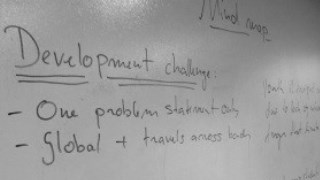Welcome to Writing Science of Delivery Case Studies! This course is about writing "science of delivery" case studies that help us extract insights and learn from implementation processes to help practitioners address important development challenges and improve public services. It offers an orientation to the research, writing, and ethics of this type of interview-based case study. It draws on the experiences of the Princeton University Innovations for Successful Societies program and the Global Delivery Initiative. The science of delivery begins with a simple observation. We often have a vision of the right policies or strategies for improving health, safety, and economic well-being. However, the real problem is getting things done. Even a simple policy intervention such as child vaccination requires much more than nurses and a stock of vaccine to be effective. Case studies are a vital tool for sharing insights about the “hows" of policy implementation and institutional reform. They trace the steps taken to produce results. They show solutions and strategies practitioners have devised to address anticipated challenges and overcome unanticipated obstacles. They help us think about how to adapt approaches so that they work in different contexts. In this course you will learn: • The key elements of a science of delivery case study • The qualities readers or audiences value • The analytical functions a science of delivery case study best serves • How to develop a research strategy • How to plan and carry out an interview • Strategies for handling common research challenges • Ways to plan the writing process • Stylistic conventions and standards that improve communication • How to manage some common writing challenges • Systems for complying with important ethical and legal standards In each of the six modules, you will have an opportunity to hear from several writers, researchers, and users in a series of short videos. Reading selections provide models and introduce you to important analytical issues, stylesheets, and other useful information. Quizzes and presentations will reinforce the concepts you have learned, and allow you to develop your own case study templates and scripts. We invite you to join us! The course is most suitable for practitioners who want to document and analyze their efforts to implement a program or build a new institution, researchers who want to trace how programs achieved results and graduate students who want an introduction to one type of case study method.

About Open Learning Campus
All registered users of OLC can experience its impact of new features. If you are already registered with OLC you can directly sign in to the new system. If you are a new user then do register to avail of the dynamic learning opportunities from WBG to deepen your knowledge and skills on a variety of development related topics. For example, you will have access to timely resources such as:
- Ted like video talks
- Podcasts
- Formal learnings (i.e., Self-paced courses/Facilitated Courses/MOOCs)
- Live events and Knowledge Exchanges
- Communities of Practice
You will have access to an extensive catalog of resources through which you can search and discover relevant learning materials.
How to Access the Course Content
To access the course content, please follow the below registration steps:
- Open https://wbg.edcast.com/
- Navigate to “No account?” and select “Create one!”. Select “Next” to continue with the next step.
- Enter the code that you received via email at the “Enter Code” field. Select “Sign in” to continue with the next step.
- Fill in your First and Last Names and select a preferred communication language. Select “Next” to continue with the next step.
- Select up to five learning goals. Select “Next” to continue with the next step.
- Select up to five skills. Select “Next” to continue with the next step.
- Congratulations and welcome to the OLC! You’ll find additional tips and suggestions inside the “Welcome to the Open Learning Campus” channel at the top of the home page.
Course Details
- Mode: Self-Paced
